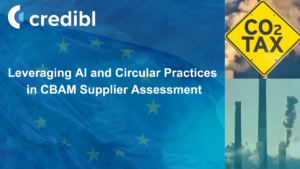Corporate Social Responsibility (CSR) and Environmental, Social, and Governance (ESG) are two buzzwords frequently used in business. Given the importance of balancing economic objectives with social and environmental responsibilities, these concepts have become increasingly essential for businesses. CSR is about how companies contribute to the welfare of society, while ESG is concerned with how companies perform in the context of environmental, social, and governance factors.
This blog post will examine the distinctions between CSR and ESG and explore why they are crucial for long-term corporate success.
- Focus:
- ESG evaluates a company’s environmental impact, social responsibility, and governance practices.
- CSR primarily revolves around the company’s obligation towards society, including activities like philanthropy and community engagement.
- Scope:
- ESG is a broader framework that covers a wide range of sustainability issues, including Scope (1,2, and 3) emission management, labor practices, human rights, and corporate governance.
- CSR is often narrowly focused on social and community initiatives.
- Business Values:
- ESG is typically integrated into a company’s core business strategy and operations.
- CSR is often viewed as a separate initiative or program disconnected from a company’s core business.
- Strategic Approach:
- ESG is more strategic and forward-looking, focusing on long-term sustainability and creating value for all stakeholders.
- CSR is often seen as a reactive approach to addressing social and environmental concerns.
- Defined Metrics:
- ESG performance is measured using a set of standardized environmental, social, and governance metrics.
- CSR initiatives may not be as clearly defined or measurable.
- Regulatory Framework:
- ESG is increasingly being regulated by governments and other organizations, with standards and guidelines developed to encourage more sustainable business practices,
- CSR is not as widely regulated.
- Timeframe:
- ESG is a long-term approach to sustainable business practices that considers the impact of a company’s actions over time.
- CSR initiatives may be more short-term and focused on immediate needs.
- Disclosure:
- ESG reporting is becoming increasingly important and in some cases mandatory to investors, stakeholders, and governments. The companies are expected to disclose their ESG performance and strategy.
- CSR reporting is often voluntary and not as comprehensive as ESG reporting.
- Stakeholder Engagement:
- ESG focused on engaging with all stakeholders, including employees, customers, suppliers, investors, and communities.
- CSR initiatives may primarily target specific stakeholder groups.
- Business Case:
- ESG is increasingly seen as a business imperative, with evidence suggesting that companies with strong ESG performance are more likely to be financially successful over the long term.
- CSR is often viewed as a cost to a company without clear financial benefits.
In conclusion, while CSR and ESG are correlated, they still serve different purposes. CSR refers to a company’s voluntary actions to improve its social and environmental impact, while ESG is a set of criteria that investors use to evaluate a company’s environmental, social, and governance practices. CSR and ESG can significantly impact the company’s reputation and long-term success, and companies that prioritize both will benefit in multiple ways.
Connect with our ESG Experts to know how to integrate ESG Data Management and Reporting into your core business strategy.







